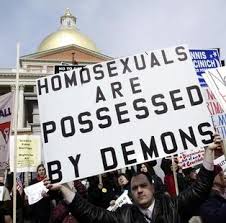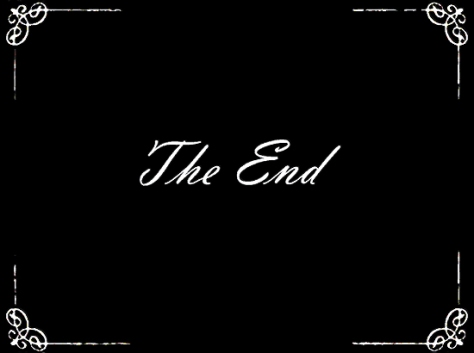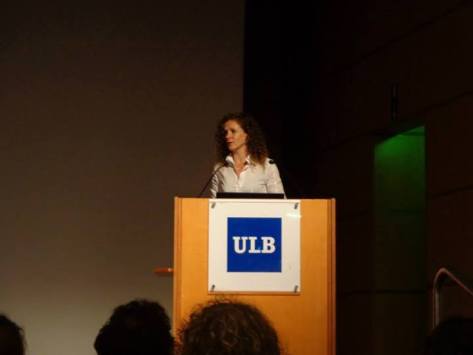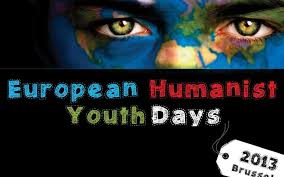As expected, this speech made me think a lot about religion and how we evaluate its place in our society. For better or worse when there are conservative problems depriving a minority of people of their rights, religion is always somewhere there, usually in the front row of the opposition, scaring people into hating each other. Again for better or worse Christianity is the main religion in Europe so that’ll be my main target – it doesn’t mean I don’t dislike other religions just as much.
Now, dislike is a strong word and might annoy even some fellow humanists-atheists but my reasons are explained in detail:
Sophie In’t Veld mentioned at some point how beautiful the diversity we have is. Variety helps us progress as people, improve ourselves. She said a story about a conversation with 2 people, one from an ex communist country and one from Spain. The first one said that in EU he found his freedom, the freedom to believe without being prosecuted for it. The second one said that in EU he found his freedom, the freedom to be an atheist without being prosecuted for it. And there they are, both free in different ways and living in harmony with each other.
That is indeed all very nice BUT the moral of this story is not that it is beautiful when people believe in different things. The moral of this story is that you shouldn’t force any believe or the lack of it to anyone. You can’t make someone be an atheist, that’s absurd and stupid.
But you can and you must educate people. Variety is nice when we like different colors and so we make our worlds colorful and happy – or black and shadowy, now THAT’s variety. Variety is nice when I don’t like mushrooms in my pizza and I give them to my friend who loves them. Variety is nice when we have different experiences and we share them, seeing the world from another point of view and maybe even re-examining some of our ideas.
Now imagine this: you walk in a conversation where one person says lightning comes from Zeus, another says it comes from Thor and another one says it comes from invisible fairies who squeeze the clouds. What are you thoughts?
“Oh gosh, what a great variety of ideas! It just made me a better person to listen to all these different opinions about how lightning comes, I better not tell them the truth and ruin that which they choose to believe”.
I sure hope not! Most people would at least try to explain that this is not a great mystery, we know what causes lightings. Ok, not all of us can explain it in perfect scientific terms but we have a notion of what’s going on and good guy wikipedia is always available for things like that.

Of course it’s a real photo sweetie!!
Well, I don’t know how to break this to you but that’s what religions are. A distorted and WRONG idea about what’s going on and loads of people who lie to themselves and defy their logic in order to keep an irrational faith. And no, this is not an elitist opinion, it’s a simple fact.
There are 2 big categories of Christians.
1. “I accept everything the church says and does, they are the word of God on earth”.
Ok, I don’t think it’s really necessary to say much about why these people are dangerous but just in case:
These people accept amazingly lots of false information regarding scientific, social and ethical matters. I met someone who thinks the earth is 6000 old. How on this-surprisingly-young-earth can I marvel in the variety of ideas there? He’s just wrong! It’s so wrong that I can’t help disliking people like that. Because they could know the truth and they choose not to. That is plain stupidity in my dictionary.
There are things that we know, things that we’ve known for years and things that the scientists know and we don’t yet cause let’s face it, we don’t bother learning them. It doesn’t mean God and the Bible are the explanation, that’s actually the opposite of explanation. As Dawkins said, if you use God to explain a phenomenon not only you don’t explain it but you also stop yourself from finding its real cause because you stop looking for it.
Also, these are the people who will kill someone because their faith says so. They are more extreme in some countries and explode themselves killing hundreds and subtler in other countries, just letting a woman die to avoid an abortion (I have to note here that they somehow fail to inform people that sex before marriage is also a sin, so having a bunch of unmarried, underage mothers is somehow ok unlike using condoms or having abortions even for medical reasons… Go figure!). I never understood why killing is a sin but letting someone die when you could very easily save them is ok. How isn’t that murder? You deny someone the chance to live, wake up, it’s not gonna send you to paradise. Of course that’s the state’s fault for allowing this things to exist, you just can’t have hospitals that treat people only if it fits their believes.
So for this category of believers I think it’s quite straightforward why the “marvelous variety” thingy doesn’t work. It’s reason and sanity against irrationality and crazy behavior. I’m not saying we should force them to think otherwise, I just think (and hope) that proper education would do the trick and of course laws should protect individuals when their safety is threatened by this insanity.
2. “I don’t accept the church or their interpretation of the bible, they are corrupted and they use it for their own means – I am a good catholic/orthodox/whatever heresy I follow, the church is just wrong at some points”
Yeah, well… No. Orthodoxy is the interpretation of the Bible according to the Orthodox Church, Catholicism is the interpretation of the Bible according to the Catholic church etc etc etc. So no, I won’t accept the easy – yet extremely cowardice – solution of rejecting the church but keeping the organized religion, I’ve done it and I know it’s just an excuse not to look too deeply to things that might shake your faith.

Would you accept he’s a humanist if he just claims he is? Words have a meaning, use them right.
You don’t get to follow a ridiculously specific dogma among the hundreds of existing Christian heresies and pick and choose which parts you like and which you don’t. That’s organized religion and dogmas, you get all or nothing. What most people do is following personal religions, choosing the parts of the books that fit better with their personality and ideas for morality. That’s good, but I’d like it if people could be self-aware and recognize that this attitude does not make them members of an organized religion. Yes, I find this very important. First of all I think it makes a person better and stronger to be able to face such simple truths about themselves and it leads them to better self understanding. Plus here is the part where I feel they temporarily pause their rational and critical thinking. Accepting arbitrary bits and pieces of an organized religion and yet passionately loving it as a whole and identify yourself as a follower of this religion even though some of your believes are in direct opposition with its dogma… Well it is kind of messed up when it comes to logic and I really value reason (more will be said in the following article).
My second problem is that they do hurt the human rights movement, even if it is indirectly.
Of course these people can very well accept scientific truths and human rights etc etc so it’s all nice but still, they almost never defy their church. When the church says something like «80% of Europe is Christian» (suddenly the differences between heresies lose their importance) they are included in the percentage. When the church makes stupid decisions and puts pressure in governments and organization to choose the wrong way these people are used as statistics and – what’s worse – they won’t go out and say “Wait, we are Catholics but we don’t want women to be treated like shit, let them do whatever they want with their bodies”. Nope, they are silent and their silence allows the church to speak representing the whole of the herd (no insult meant, it’s bible’s terminology). Their inaction has consequences and they have to face them.
I’m not going to argue over the existence of a God as described by Deism – the philosophy of it is interesting but not within the objectives of this article. Such a God would be out of reach, not represented by holly books and cannot be used as an argument in favour of organized religion which – I can’t stress this point enough – promotes very specific believes and moral behaviour.
Respecting one’s beliefs doesn’t mean you are not allowed to criticize them or to try and educate them if they lack some knowledge or even try to change those beliefs if they result in people getting hurt.
In our strive to be politically correct we forget that people can make mistakes and that sometimes it’s not a matter of different viewpoints but of right and wrong.
Previous Article: EHYD – Sophie In’T Veld
Next Article: EHYD – Philipp Blom





